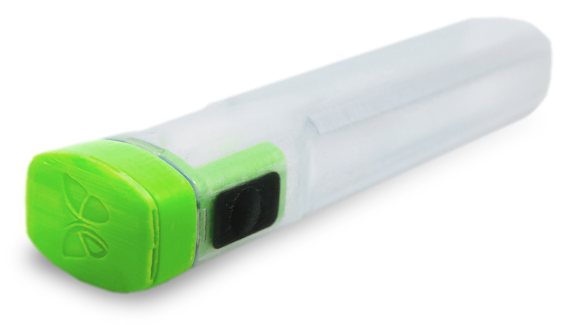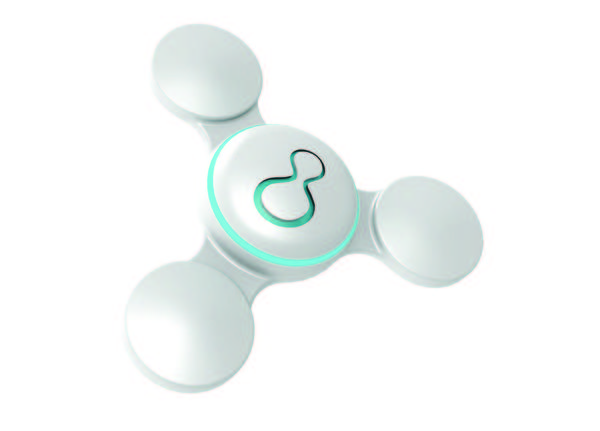Perhaps you already use your smartphone for grocery lists and calendar alerts for doctor appointments and meetings. Maybe you already use a wearable fitness tracker, like a FitBit, to help you stay in shape. What if your phone also told you and your child when an EpiPen® was left behind? Or warned you of an impending asthma attack?
Every January media and technology insiders flock to Las Vegas for the trade show known as the Consumer Electronics Show (CES). (It’s not open to the public). Earlier this month two interesting devices were unveiled related to food allergies and asthma.
A “Smart” Case for EpiPen®
Have you ever left the house without an EpiPen®, the epinephrine autoinjector from Mylan Specialty? A Canadian company has created a special wireless technology-enabled case for it that will let you know when you have left it somewhere, or when it has reached an extreme temperature. It also lets you know when the cap has been opened, suggesting that an emergency has occurred or is about to happen. The case is called the Veta.
The Veta smart case consists of a transparent plastic case, a “smart cap” with sensors, and a button for emergencies. The sensors on the case link to the Veta app. The app is available for compatible iPhone, iPad, iPod touch or Android phones and tablets.

The system includes several features to track the status or location of the EpiPen®. It includes a “find me” function with flashing light and audible sounds to find a misplaced case; an alert if you get too far away from your case; a temperature sensor if the case is in extreme temperatures, and an emergency notification feature if the cap is pulled.
For instance, let’s say your babysitter has taken your child to the park and you are at work. If the cap were pulled off the device, your Veta-enabled smartphone is designed to instantly alert you that something might be happening. Or if your teen has gone on a field trip and has left the case behind, the app on their smartphone would begin to sound.
The Veta case comes at a price. Each case is $59, so two cases would be about $120. Right now, it is offered just for the EpiPen®, not for the Sanofi brand autoinjector, Auvi-Q®, or the generic, by Lineage Therapeutics Inc.
A company representative said other types of cases are under development, however, and there are discounts for multiple Veta cases while they are in the preorder phase.
A Wearable for Asthma Management
A start-up company from Rochester, NY created another early warning system, this one for asthma. One of the tricky parts about asthma is sticking to a medication plan and managing symptoms effectively. This makes it like other chronic diseases without a cure. Without being "compliant" with your medications, you can get sick faster.
The device unveiled this month is called the ADAMM. It stands for Automated Device for Asthma Monitoring and Management. It aims to keep people healthier by allowing them to stay on top of warning signs that could signal breathing problems. This would reduce the use of emergency medications and prevent ER trips.
This wearable device is designed to become customized for the person wearing it. It is supposed to track a number of things that might signal a worsening of someone’s asthma. For instance, the ADAMM will record the number of coughs and how often they happen. This is important for someone with cough-variant asthma, who might not wheeze. It can also track respiration rate and heart rate.

It can automatically detect and record when someone is using an inhaler. It can send medication reminders to increase compliance with a treatment plan.
It sends this information to a smartphone app or web portal that a parent could view. It can also be sent to a confidential web site that a doctor could access, with permission.
The ADAMM may take the guesswork out of managing asthma. The ultimate goal is to cut down on asthma sickness and deaths.
The creators are hoping to launch towards the end of this year. The device may cost around $99-$130, depending on final manufacturing costs. There will also be a monthly subscription fee of $9.99 a month for the cloud-based service.
The ADAMM won an award during CES in the category of “Tech for a Better World.”
Neither of these products are available yet. Undoubtedly, there may be other companies working on similar ways to make managing food allergies and asthma easier through the use of technology. What would you like to see? What would work best for you and your family? Leave a comment below, or join the conversation on our Kids With Food Allergies Main Support Forum
or on Facebook!
News about products that appear in the KFA Blog does not mean that we are endorsing the product. Please check with your doctor if you are trying to decide if a new product is right for your family.



Comments (2)